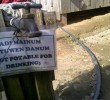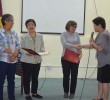URGENT APPEAL
06 January 2012
The Center for Trade Union and Human Rights is writing to you to seek your support for 293 of oil palm workers who were unjustly dismissed and were refused to go back to work following the lifting of strike last February 1 of nearly 1,000 workers of Filipinas Palmoil Plantations Inc. (FPPI).
These 293 workers were previously employed as casual employees in FPPI for as much as 30 years until an ocular inspection was conducted by the Department of Labor and Employment (DOLE) on October 23 as a result of the union’s long campaign against unjust working conditions in the plantation.
The inspection’s initial findings released on October 25 confirmed the company’s massive violations of labor standards. In an apparent retaliatory move, the management dismissed one by one all workers interviewed by DOLE in their inspection except a few (11) who agreed to sign a waiver. This action of the management prompted the workers’ union to launch a strike on November 27, which lasted until January 31 nearly two weeks after the Secretary of Labor assumed jurisdiction over the strike.
Issues of long term contractualization, CBA violations and child labor also hound the oil palm company. Two months hence, the DOLE is still reluctant to hold the company liable for its clear violations of the law.
Case Summary
Nearly 300 casual workers of FPPI are still jobless even after the return to work order of the DOLE following the Labor Secretary’s assumption of jurisdiction (AJ) of FPPI workers’ strike on January 18, 2013.
Workers of FPPI lifted their two-month battle on January 31, 2013 several days after DOLE Secretary assumed jurisdiction over the strike. However, FPPI management denied 293 workers of their work insisting that they do not know and have never hired these workers.
On November 27, 2012, nearly 1000 workers together with their families launched a strike on grounds of unfair labor practices of the FPPI management and unjust dismissal of 293 casual workers. These 293 workers were previously interviewed by representatives of the DOLE-Caraga during the October 23 ocular inspection. The findings released on October 25 confirmed the company’s massive violation of labor standards such as underpayment of wages and absence of social security insurance for workers.
Massive violation of labor standards and long term-contractualization
As early as April 2008, workers of FPPI led by FPP Workers’ Union, has urged the management to implement labor standards as most workers, especially those who have long been in casual status, receive wages below minimum rate (only PHP150.00 a day versus the legally mandated PHP248.00) and do not receive social security benefits such as SSS, PhilHealth and PAG-IBIG. The union, since 2008, had been also calling for the regularization of at least 198 workers who remained casual employees despite having worked in the company for at least five years to as much as 30 years.
Their long fight finally resulted to an ocular inspection on October 23, 2012 conducted by the representatives from DOLE-Caraga. More than 200 workers were interviewed in the one-day inspection. And on October 25, DOLE-Caraga released its initial findings confirming the massive violations of labor standards by the FPPI. The findings also noted at least PHP 9,000,000 worth of money claims for the workers.
Unfair dismissal
However, instead of correcting their violations of the law, the FPPI management, questioned the findings, saying the inspection findings is flawed and that the workers interviewed were not workers of FPPI. Worse, the workers who were interviewed by DOLE-Caraga representatives were persuaded by the management to sign a waiver retracting their statements or they will be relieved from work. Those who will sign a waiver however can keep their jobs as casual employees and receive PHP 3,000.00.
Only 11 workers signed the waiver, the rest who refused to sign were dismissed one by one by the management until on November 16, all workers interviewed were already dropped from the ranks of FPPI workforce. This issue, aside from other unfair labor practices of the company, prompted the union to hold a strike.
Moreover, dismissed workers are mostly agrarian reform beneficiaries (landowners) and are members of the cooperatives that lease land to FPPI. Part of the agreement between them and the management is to hire them as workers in the plantation.
Collective bargaining deadlock
Since 2008, FPPI management has also refused to give the workers the amount of wage hike they were asking during their collective negotiations. This issue plus the company’s refusal to implement the CBA benefits to 198 casual employees, in fact led to a previous strike of workers in 2010.
Late in 2011, FPPI Workers’ Union (FPPIWU) filed a new collective bargaining agreement (CBA) which the management refused to acknowledge saying that their CBA has expired since five years have lapsed. Consequently, a certification election was held on March 17, 2012; FPPIWU won the union election and the union followed up their previous CBA. On May 8, 2012 sitting, the company did not provide a written counterproposal. Between June to August, a series of negotiations ensued between FPPIWU and the management. The management offered a meager 2-2-3 (in pesos or US$0.05, 0.05, 0.07)) staggered daily wage hike for the next three years which is way below the union’s 100-125-150 (in pesos) proposal. In August, the company, slightly raised its offer to PHP 3-3-4 but the union finds this unacceptable given the high profits of company. On September 17, a CBA deadlock was officially declared.
Harassment of union members
On Oct. 4, 2012, Rexon Generol, a member of FPPIWU spoke in the Manila launch of CTUHR’s research on child labor and workers’ situation in oil palm plantation in Caraga (The book is entitled Children of Sunshine Industry).
Generol gave a testimony about their dire working conditions as a result of long term contractualization which he experienced personally. Generol started working for FFPI when he was 14 years old and have been working there for 27 years, yet he remains in casual status receiving wages below the minimum rate, no social security and no benefits given to regular employees (such as rice allowance plus other bonuses).
Generol was wary that when he comes back to Agusan del Sur, he might lose his job after exposing to the public their conditions in FPPI. And true enough, when he was about to work on October 8, he found out that he was already dismissed.
Intimidation while on strike
While on strike, workers continue to experience intimidation and heated confrontations from members of Special Citizen Active Auxiliary (SCAA) and the company’s security personnel.
On December 13, around 10 PM, workers were alarmed when they heard from behind their post, six shots (two shots from a triangle, one from a pistol and three shots from an M-14). They learned that the shots were fired by members of the SCAA whose post is just a few meters away from the picket line. Workers suspect that the shots were aimed at creating fear among strikers as SCAA members laughed and made fun of the incident afterwards.
On January 12, 2013, the strikers were threatened (by the management) that they will be charged with company bankruptcy because of the strike. Through the SCAA and Agency Security Group (FPPI’s security guard), workers were persuaded to sign a waiver that they will no longer join the strike and will go back to work. Only six workers signed the waiver.
Two days after, on Jan. 14, an argument between the strikers and the guards ensued when the workers blocked the supervisors and managers from entering the plantation premises. To avoid future conflict, the strikers have previously drafted an agreement with the SCAA and the ASG that no personnel of the company will be allowed to enter the premises while the strike is still on. SCAA and ASG however declined to sign the agreement.
During the heated exchange, security forces of the company (identified as Limyado, Awitan, Sakal and Dondi Carbin) cocked their guns at Mr. Jowarh Quita, a staff of the union, while the latter was taking a video footage of the said confrontation. The guards were insisting that a newly-built “boom” by the workers be removed. The “boom” was installed by the workers to block the passages of those who would be working while there is still a strike.
Misleading dialogues and unfruitful negotiations
Since the strike started on November 27, the union has been always open to negotiations with the company and the government. In several occasions, the FPPI management has postponed their scheduled negotiations, while the government remains lukewarm in holding the company liable for its violations of labor standards.
Union officials lament that instead of settling the issue, the government is setting up meetings that divert the issue and threaten the striking workers. On December 7 for instance, the government called for an inter-agency dialogue with the strikers.
Representatives from the DOLE, Department of Social Welfare and Development (DSWD) and the local government unit (LGU) were present in the dialogue. The union representative noted that the DOLE representative asked the workers if they can “lift ” the strike for the spirit of Christmas, but said nothing about the workers demands. DSWD as well as the LGU expressed concern over the children of workers who are staying in the picket line.
Several talks between company officials, the union, and the DOLE happened but were not fruitful. The first was on Dec. 21, nearly a month after the strike started followed by another on Dec 30, Jan 7, and 9. While the union went as far as lowering their demands from implementing the labor standards to reinstating casual employees unjustly dismissed, the company however denied having hired, or had known the 293 workers it terminated following DOLE’s ocular inspection on October 23. As for the negotiated wage hike, the company, stood firm in its offer of PHP 3-PHP3-PHP 4 daily wage hike for the next three years.
On January 18, the Department of Labor and Employment assumed jurisdiction (AJ) over the strike and ordered all workers to go back to their work. The workers were wary that the AJ order may later cause violence as in other cases of violent dispersal of strikes.
On two negotiations in Manila on January 24 and 28 this year, workers’ demands were hardly settled. Even if the strike has been lifted, they are still struggling for the reinstatement of the 293 casual workers, their eventual regularization.
The labor law (Article 280 of the Labor Code) is clear that contract or even seasonal workers will be considered regular or permanent if they work for a company for a one year, even if the employment is intermittent. Repeated renewal of contract, much more years of employment proves that the work being done by those considered ‘casual’ by the company is necessary and desirable i.e. production will be severely affected if they those workers are removed from work. The 293 casual workers at FPPI are mostly harvesters, without them, there will be no fruits to grind and no oil to sell.
The discrimination and rights violations of 293 workers are clear, they were not only deprived of monetary and welfare benefits due to regular workers and union members, they were deprived of their right to security of tenure and their basic right to life as they were thrown to living in dire situation. Their children are forced to work in the field for family survival. More importantly, their dismissals after testimony to a government inspection must be accorded with protection against retaliatory acts by employer; lest injustice will continue to be committed against these workers, and trust on the administration of justice weill continue to be questioned.
Background of the company
Filipinas Palm Oil Plantations Inc. was established in 1980 in the municipality of Rosario in Agusan del Sur. It is 60 percent-owned by a Filipino and 40 percent Indonesian. It covers 8,000 hectares of oil palm plantations in San Francisco and Rosario Agusan del Sur. Government estimates its average production to as much as 40 metric tons of fresh fruit bunch of oil palm per hour and used to export its products to the US, Japan, Malaysia and Europe in the 1990s. To date, local consumption for palm oil has increased and FPPI is a supplier for known food companies namely Monde Nissin Corporation, Nissin Corporation, Wyeth Philippines, Universal Robina Corporation, Ecco Food Corporation, and Magnolia Corporation.
Workers computation of companies minimum gross earnings per hectare of land per month is equivalent to PHP 22,080. Ratio of worker to hectare is 1:4; land rent per hectare per month a measly PHP 166 under the existing lease agreement between the agrarian reform beneficiaries (ARBs) who lease out the land to FPPI through cooperatives.
Action Needed:
In support of the dismissed workers in FPPI, please write to the authorities imploring them to:
1) Immediately bring back to work the 293 unjustly dismissed workers of FPPI, promote them into regular status as provided by law, and accord them with rights and benefits due them;
2) Hold FPPI liable for its massive violation of labor standards and regularize all workers who have been working in the company for at least one year, and implement all provisions of the collective bargaining agreement to all workers, without discrimination, thus, reducing incidence of child labor in the plantation;
3) Stop all forms of harassments, threats and intimidation against all workers and their family members who joined the strike;
3) For the Department of Labor and Employment to uphold its Department’s findings on the October 23 ocular inspection that verified massive labor standards violations of FPPI; hold the FPPI management liable to the all workers especially those who have been unjustly dismissed.
4) For DOLE and the Commission on Human Rights (CHR), to institute mechanisms and provide protection against any retaliatory actions, and provide assistance to all workers and/or trade unionists who come out to testify and speak about their situation.
5) For President Benigno Aquino III and its economic managers to investigate the condition of palm oil workers and communities, effectively address the problem of child labor and poverty of affected communities’ before any expansion of oil palm plantation is pursued.
Please send your letters to the following:
H.E. Benigno C. Aquino III
President of the Republic
Malacañang Palace,
JP Laurel St., San Miguel
Manila Philippines
Voice: (+632) 564 1451 to 80
Fax: (+632) 742-1641 / 929-3968
E-mail: corres@op.gov.ph / opnet@ops.gov.ph
Hon. Loretta Ann P. Rosales
Chairperson, Commission on Human Rights
SAAC Bldg., UP Complex
Commonwealth Avenue
Diliman, Quezon City, Philippines
Voice: (+632) 928-5655, 926-6188
Fax: (+632) 929 0102
Email: chair.rosales.chr@gmail.com, lorettann@gmail.com
Hon. Rosalinda Dimapilid Baldoz
Secretary, Department of Labor and Employment
7th Floor DOLE Bldg., Intramuros,
Fax no.: (632) 336-8182
Email: secrdb@dole.gov.ph
S.K. Tan
General Manager
Filipinas Palm Plantations Inc
7/F Citibank Center
8741 Paseo de Roxas, Makati City
Tel: +6328127541
Fax: +632.817.5753
Dennis Villareal
President
Filipinas Palm Plantations Inc
7/F Citibank Center
8741 Paseo de Roxas, Makati City
Telephone: +632 8127541-46
Email: denn.villa@gmail.com
Please send us a copy of your email/mail/fax to the above-named government officials, to us: email pie.ctuhr@gmail.com; telefax (02) 411-0256.
Thank you very much for your support.










